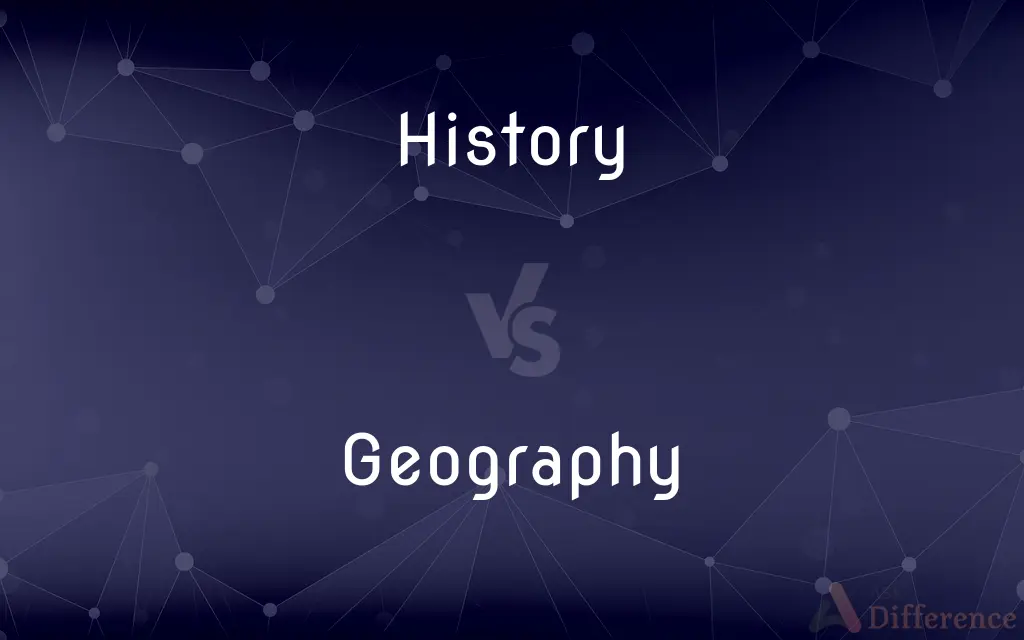History vs. Geography — What's the Difference?
Edited by Tayyaba Rehman — By Maham Liaqat — Updated on April 3, 2024
History explores the chronological record of events, as relating to the human race, while geography is the study of the Earth's landscapes, environments, and the relationships between people and their environments.

Difference Between History and Geography
Table of Contents
ADVERTISEMENT
Key Differences
History delves into the past actions, decisions, and movements of societies and individuals, emphasizing the cause and effect of events over time. Geography, on the other hand, focuses on the spatial aspects of the natural and human-made features of the Earth, including the study of places, the distribution of people and resources, and the interactions between humans and their environment.
While history is concerned with understanding how societies have changed and developed through time, geography provides insight into the physical and human processes that shape the world's surfaces and how these processes interact. History tends to be linear, focusing on sequences of events, whereas geography is more spatial, concerned with the arrangement of things in space and the interconnections between places.
Historians often use written records, artifacts, and oral traditions to reconstruct past events and understand their implications for the present and future. Geographers, however, utilize tools like maps, satellite imagery, and field observations to analyze the physical characteristics of the Earth and human activities within various regions.
The study of history is essential for understanding the evolution of civilizations, cultures, and institutions. Geography, by emphasizing the relationships between people and their environments, helps explain patterns of settlement, economic development, and cultural diversity across different regions.
Comparison Chart
Focus
Chronological events and societies.
Earth’s landscapes and human-environment interactions.
ADVERTISEMENT
Approach
Linear (sequence of events).
Spatial (arrangement and interaction of physical and human phenomena).
Tools/Methods
Written records, artifacts, oral traditions.
Maps, satellite imagery, field observations.
Main Concern
Understanding changes and development over time.
Analyzing physical characteristics and human activities.
Key Insights
Evolution of civilizations, cultures, institutions.
Patterns of settlement, economic development, cultural diversity.
Compare with Definitions
History
The past considered as a whole.
Studying the history of ancient civilizations helps us understand modern societies.
Geography
The study of human activity as it affects and is affected by these physical features.
Urban geography examines how cities develop and impact their environments.
History
The study of past events, particularly in human affairs.
The history of the Roman Empire offers insights into governance and warfare.
Geography
The science dealing with the area, distribution, and relationships between different places.
Cultural geography studies how traditions vary from one region to another.
History
A narrative or account of past events.
His book presents a detailed history of the Industrial Revolution.
Geography
The study of the physical features of the Earth and its atmosphere.
Geography classes explore how rivers and mountains influence human settlements.
History
The cumulative impact of past events on the present.
The history of colonialism still affects current international relations.
Geography
A field that uses tools like GIS (Geographic Information Systems) to analyze spatial data.
Geographers use GIS to map demographic changes over time.
History
A chronological record of significant events affecting a nation or institution.
The museum displayed the history of aviation from its inception to the modern era.
Geography
The nature and relative arrangement of places and physical features.
The geography of the Pacific Northwest includes diverse ecosystems and volcanoes.
History
History (from Greek ἱστορία, historia, meaning "inquiry; knowledge acquired by investigation") is the study of the past. Events before the invention of writing systems are considered prehistory.
Geography
Geography (from Greek: γεωγραφία, geographia, literally "earth description") is a field of science devoted to the study of the lands, features, inhabitants, and phenomena of the Earth and planets. The first person to use the word γεωγραφία was Eratosthenes (276–194 BC).
History
A chronological record of events, as of the life or development of a people or institution, often including an explanation of or commentary on those events
A history of the Vikings.
Geography
The study of the physical features of the earth and its atmosphere, and of human activity as it affects and is affected by these, including the distribution of populations and resources and political and economic activities.
History
A formal written account of related natural phenomena
A history of volcanoes.
Geography
The study of the earth and its features and of the distribution of life on the earth, including human life and the effects of human activity.
History
A record of a patient's general medical background
Took the patient's history.
Geography
The physical characteristics, especially the surface features, of an area.
History
An established condition or pattern of behavior
An inmate with a history of mental illness and drug abuse.
Geography
A book on geography.
History
The branch of knowledge that records and analyzes past events
"History has a long-range perspective" (Elizabeth Gurley Flynn).
Geography
An ordered arrangement of constituent elements
Charting a geography of the mind.
History
The past events relating to a particular thing
The history of their rivalry is full of intrigue.
Geography
A description of the earth: a treatise or textbook on geography
History
The aggregate of past events or human affairs
Basic tools used throughout history.
Geography
An atlas or gazetteer.
History
An interesting past
A house with history.
Geography
The study of the physical properties of the earth, including how humans affect and are affected by them.
History
Something that belongs to the past
Their troubles are history now.
Geography
Terrain: the physical properties of a region of the earth.
History
(Slang) One that is no longer worth consideration
Why should we worry about him? He's history!.
Geography
Any subject considered in terms of its physical distribution.
History
A drama based on historical events
The histories of Shakespeare.
Geography
Similar books, studies, or regions concerning other planets.
History
The aggregate of past events.
History repeats itself if we don’t learn from its mistakes.
Geography
The physical arrangement of any place, particularly a house.
History
The branch of knowledge that studies the past; the assessment of notable events.
He teaches history at the university.
History will not look kindly on these tyrants.
He dreams of an invention that will make history.
Geography
The lavatory: a room used for urination and defecation.
History
The portion of the past that is known and recorded by this field of study, as opposed to all earlier and unknown times that preceded it (prehistory).
In all of human history and prehistory
In all recorded history
Geography
The relative arrangement of the parts of anything.
History
(countable) A set of events involving an entity.
What is your medical history?
The family's history includes events best forgotten.
A long and sordid history
Geography
A territory: a geographical area as a field of business or market sector.
History
(countable) A record or narrative description of past events.
I really enjoyed Shakespeare's tragedies more than his histories.
A short history of post-Columbian colonization
Geography
The science which treats of the world and its inhabitants; a description of the earth, or a portion of the earth, including its structure, features, products, political divisions, and the people by whom it is inhabited. It also includes the responses and adaptations of people to topography, climate, soil and vegetation
History
A list of past and continuing medical conditions of an individual or family.
A personal medical history is required for the insurance policy.
He has a history of cancer in his family.
This diagnosis is usually based solely on the history and physical examination, although laboratory tests are occasionally also obtained.
Geography
A treatise on this science.
History
A record of previous user events, especially of visited web pages in a browser.
I visited a great site yesterday but forgot the URL. Luckily, I didn't clear my history.
Geography
Study of the earth's surface; includes people's responses to topography and climate and soil and vegetation
History
(informal) Something that no longer exists or is no longer relevant.
I told him that if he doesn't get his act together, he's history.
History
(uncountable) Shared experience or interaction.
There is too much history between them for them to split up now.
He has had a lot of history with the police.
History
(obsolete) To narrate or record.
History
A learning or knowing by inquiry; the knowledge of facts and events, so obtained; hence, a formal statement of such information; a narrative; a description; a written record; as, the history of a patient's case; the history of a legislative bill.
History
A systematic, written account of events, particularly of those affecting a nation, institution, science, or art, and usually connected with a philosophical explanation of their causes; a true story, as distinguished from a romance; - distinguished also from annals, which relate simply the facts and events of each year, in strict chronological order; from biography, which is the record of an individual's life; and from memoir, which is history composed from personal experience, observation, and memory.
Histories are as perfect as the historian is wise, and is gifted with an eye and a soul.
For aught that I could ever read,Could ever hear by tale or history.
What histories of toil could I declare!
Justly Cæsar scorns the poet's lays;It is to history he trusts for praise.
No more yet of this;For 't is a chronicle of day by day,Not a relation for a breakfast.
Many glorious examples in the annals of our religion.
History
To narrate or record.
History
The aggregate of past events;
A critical time in the school's history
History
The continuum of events occurring in succession leading from the past to the present and even into the future;
All of human history
History
A record or narrative description of past events;
A history of France
He gave an inaccurate account of the plot to kill the president
The story of exposure to lead
History
The discipline that records and interprets past events involving human beings;
He teaches Medieval history
History takes the long view
History
All that is remembered of the past as preserved in writing; a body of knowledge;
The dawn of recorded history
From the beginning of history
Common Curiosities
How do historians and geographers research their topics?
Historians research using written records, artifacts, and oral histories to reconstruct past events, while geographers use maps, satellite imagery, and fieldwork to study the Earth's features and human activities.
Why is it important to study both history and geography?
Studying both disciplines is essential for a comprehensive understanding of how human societies have developed over time and how they interact with their physical environment.
How do history and geography interact?
History and geography interact through the study of how geographical features have influenced historical events and the development of societies, such as how mountains and rivers have affected migrations, wars, and trade.
What is the importance of maps in geography?
Maps are essential in geography as they provide a visual representation of physical features, human-made structures, and various phenomena across the Earth’s surface, facilitating spatial understanding and analysis.
Can history help predict future trends?
While history does not predict the future, it can provide insights into patterns and consequences of human actions, helping to inform future decisions and possibilities.
Can geography influence history?
Yes, geography can significantly influence history by shaping human settlement patterns, economic activities, and interactions between different societies.
What is the main difference between history and geography?
The main difference is that history studies the chronological record of past events and human societies, while geography focuses on the Earth's physical features and the interaction between humans and their environment.
What role does technology play in geography?
Technology, especially Geographic Information Systems (GIS), plays a crucial role in geography by enabling the analysis and visualization of spatial data to understand patterns and processes on the Earth's surface.
What is cultural geography?
Cultural geography is a subfield of geography that examines how cultural practices, beliefs, and phenomena are spatially distributed and how they interact with the physical environment.
Why are timelines important in history?
Timelines are important in history because they organize events chronologically, helping to understand the sequence, duration, and temporal relationships between events.
How do geographical features impact human history?
Geographical features like rivers, mountains, and climate zones have impacted human history by determining settlement locations, migration routes, and the development of agricultural and economic systems.
What is physical geography?
Physical geography is a branch of geography dealing with natural features and processes of the Earth, such as climate, ecosystems, and landforms.
How has the study of history evolved over time?
The study of history has evolved from a focus on great leaders and events to include social, economic, and cultural perspectives, employing a wider range of sources and methodologies.
How does geography influence economic development?
Geography influences economic development through the availability of natural resources, the accessibility of trade routes, and the suitability of land for agriculture and settlement.
What is environmental history?
Environmental history is a field that explores the interactions between humans and their environment over time, examining how nature has influenced human history and vice versa.
Share Your Discovery

Previous Comparison
Spark vs. Flame
Next Comparison
Wealth vs. WelfareAuthor Spotlight
Written by
Maham LiaqatEdited by
Tayyaba RehmanTayyaba Rehman is a distinguished writer, currently serving as a primary contributor to askdifference.com. As a researcher in semantics and etymology, Tayyaba's passion for the complexity of languages and their distinctions has found a perfect home on the platform. Tayyaba delves into the intricacies of language, distinguishing between commonly confused words and phrases, thereby providing clarity for readers worldwide.















































